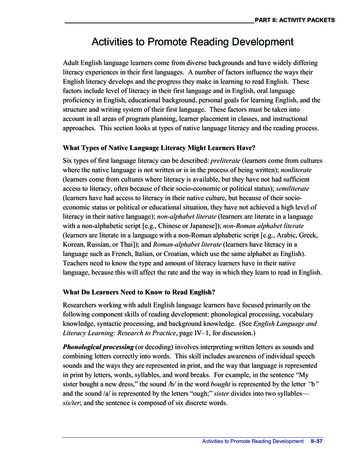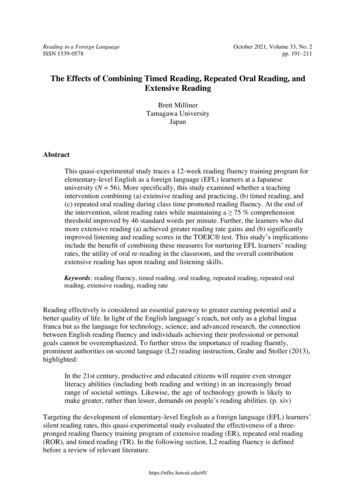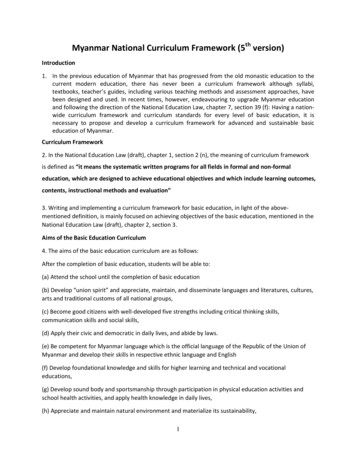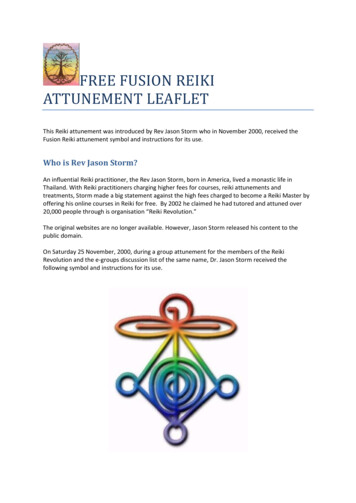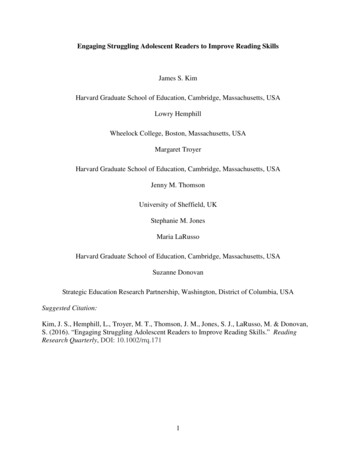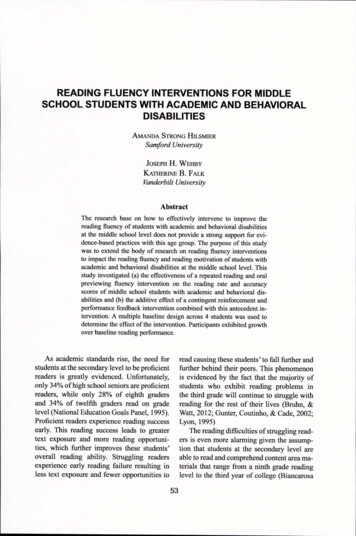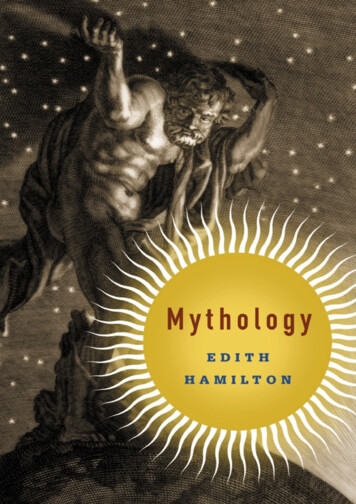
Transcription
Begin ReadingTable of ContentsNewslettersCopyright PageIn accordance with the U.S. Copyright Act of 1976, the scanning, uploading, and electronic sharing ofany part of this book without the permission of the publisher constitute unlawful piracy and theft of theauthor’s intellectual property. If you would like to use material from the book (other than for reviewpurposes), prior written permission must be obtained by contacting the publisher atpermissions@hbgusa.com. Thank you for your support of the author’s rights.
PrefaceOceanofPDF.comA book on Mythology must draw from widely different sources. Twelvehundred years separate the first writers through whom the myths have comedown to us from the last, and there are stories as unlike each other as“Cinderella” and “King Lear.” To bring them all together in one volume isreally somewhat comparable to doing the same for the stories of Englishliterature from Chaucer to the ballads, through Shakespeare and Marlowe andSwift and Defoe and Dryden and Pope and so on, ending with, say, Tennysonand Browning, or even, to make the comparison truer, Kipling andGalsworthy. The English collection would be bigger, but it would not containmore dissimilar material. In point of fact, Chaucer is more like Galsworthyand the ballads like Kipling than Homer is like Lucian or Aeschylus likeOvid.Faced with this problem, I determined at the outset to dismiss any idea ofunifying the tales. That would have meant either writing “King Lear,” so tospeak, down to the level of “Cinderella”—the vice versa procedure beingobviously not possible—or else telling in my own way stories which were inno sense mine and had been told by great writers in ways they thought suitedtheir subjects. I do not mean, of course, that a great writer’s style can bereproduced or that I should dream of attempting such a feat. My aim has beennothing more ambitious than to keep distinct for the reader the very differentwriters from whom our knowledge of the myths comes. For example, Hesiodis a notably simple writer and devout; he is naïve, even childish, sometimescrude, always full of piety. Many of the stories in this book are told only byhim. Side by side with them are stories told only by Ovid, subtle, polished,artificial, self-conscious, and the complete skeptic. My effort has been tomake the reader see some difference between writers who were so different.After all, when one takes up a book like this, one does not ask howentertainingly the author has retold the stories, but how close he has broughtthe reader to the original.My hope is that those who do not know the classics will gain in this waynot only a knowledge of the myths, but some little idea of what the writerswere like who told them—who have been proved, by two thousand years and
more, to be immortal.
Introduction to Classical MythologyOf old the Hellenic race was marked off from the barbarian as morekeen-witted and more free from nonsense.HERODOTUS I: 60.GREEK and Roman mythology is quite generally supposed to show us theway the human race thought and felt untold ages ago. Through it, according tothis view, we can retrace the path from civilized man who lives so far fromnature, to man who lived in close companionship with nature; and the realinterest of the myths is that they lead us back to a time when the world wasyoung and people had a connection with the earth, with trees and seas andflowers and hills, unlike anything we ourselves can feel. When the storieswere being shaped, we are given to understand, little distinction had as yetbeen made between the real and the unreal. The imagination was vividly aliveand not checked by the reason, so that anyone in the woods might see throughthe trees a fleeing nymph, or bending over a clear pool to drink, behold in thedepths a naiad’s face.The prospect of traveling back to this delightful state of things is held outby nearly every writer who touches upon classical mythology, above all bythe poets. In that infinitely remote time primitive man couldHave sight of Proteus rising from the sea;Or hear old Triton blow his wreathèd horn.And we for a moment can catch, through the myths he made, a glimpse of thatstrangely and beautifully animated world.But a very brief consideration of the ways of uncivilized peoples
everywhere and in all ages is enough to prick that romantic bubble. Nothing isclearer than the fact that primitive man, whether in New Guinea today or eonsago in the prehistoric wilderness, is not and never has been a creature whopeoples his world with bright fancies and lovely visions. Horrors lurked in theprimeval forest, not nymphs and naiads. Terror lived there, with its closeattendant, Magic, and its most common defense, Human Sacrifice. Mankind’schief hope of escaping the wrath of whatever divinities were then abroad layin some magical rite, senseless but powerful, or in some offering made at thecost of pain and grief.THE MYTHOLOGY OF THE GREEKSThis dark picture is worlds apart from the stories of classical mythology. Thestudy of the way early man looked at his surroundings does not get much helpfrom the Greeks. How briefly the anthropologists treat the Greek myths isnoteworthy.Of course the Greeks too had their roots in the primeval slime. Of coursethey too once lived a savage life, ugly and brutal. But what the myths show ishow high they had risen above the ancient filth and fierceness by the time wehave any knowledge of them. Only a few traces of that time are to be found inthe stories.We do not know when these stories were first told in their present shape;but whenever it was, primitive life had been left far behind. The myths as wehave them are the creation of great poets. The first written record of Greece isthe Iliad. Greek mythology begins with Homer, generally believed to be notearlier than a thousand years before Christ. The Iliad is, or contains, the oldestGreek literature; and it is written in a rich and subtle and beautiful languagewhich must have had behind it centuries when men were striving to expressthemselves with clarity and beauty, an indisputable proof of civilization. Thetales of Greek mythology do not throw any clear light upon what earlymankind was like. They do throw an abundance of light upon what earlyGreeks were like—a matter, it would seem, of more importance to us, who aretheir descendants intellectually, artistically, and politically, too. Nothing welearn about them is alien to ourselves.People often speak of “the Greek miracle.” What the phrase tries toexpress is the new birth of the world with the awakening of Greece. “Oldthings are passed away; behold, all things are become new.” Something likethat happened in Greece.
The Greeks, unlike the Egyptians, made their gods in their own image.
Why it happened, or when, we have no idea at all. We know only that inthe earliest Greek poets a new point of view dawned, never dreamed of in theworld before them, but never to leave the world after them. With the comingforward of Greece, mankind became the center of the universe, the mostimportant thing in it. This was a revolution in thought. Human beings hadcounted for little heretofore. In Greece man first realized what mankind was.The Greeks made their gods in their own image. That had not entered themind of man before. Until then, gods had had no semblance of reality. Theywere unlike all living things. In Egypt, a towering colossus, immobile, beyondthe power of the imagination to endow with movement, as fixed in the stoneas the tremendous temple columns, a representation of the human shapedeliberately made unhuman. Or a rigid figure, a woman with a cat’s headsuggesting inflexible, inhuman cruelty. Or a monstrous mysterious sphinx,aloof from all that lives. In Mesopotamia, bas-reliefs of bestial shapes unlikeany beast ever known, men with birds’ heads and lions with bulls’ heads andboth with eagles’ wings, creations of artists who were intent upon producingsomething never seen except in their own minds, the very consummation ofunreality.These and their like were what the pre-Greek world worshiped. One needonly place beside them in imagination any Greek statue of a god, so normaland natural with all its beauty, to perceive what a new idea had come into theworld. With its coming, the universe became rational.Saint Paul said the invisible must be understood by the visible. That wasnot a Hebrew idea, it was Greek. In Greece alone in the ancient world peoplewere preoccupied with the visible; they were finding the satisfaction of theirdesires in what was actually in the world around them. The sculptor watchedthe athletes contending in the games and he felt that nothing he could imaginewould be as beautiful as those strong young bodies. So he made his statue ofApollo. The storyteller found Hermes among the people he passed in thestreet. He saw the god “like a young man at the age when youth is loveliest,”as Homer says. Greek artists and poets realized how splendid a man could be,straight and swift and strong. He was the fulfillment of their search for beauty.They had no wish to create some fantasy shaped in their own minds. All theart and all the thought of Greece centered in human beings.Human gods naturally made heaven a pleasantly familiar place. TheGreeks felt at home in it. They knew just what the divine inhabitants didthere, what they ate and drank and where they banqueted and how theyamused themselves. Of course they were to be feared; they were verypowerful and very dangerous when angry. Still, with proper care a man couldbe quite fairly at ease with them. He was even perfectly free to laugh at them.
Zeus, trying to hide his love affairs from his wife and invariably shown up,was a capital figure of fun. The Greeks enjoyed him and liked him all thebetter for it. Hera was that stock character of comedy, the typical jealous wife,and her ingenious tricks to discomfit her husband and punish her rival, farfrom displeasing the Greeks, entertained them as much as Hera’s moderncounterpart does us today. Such stories made for a friendly feeling. Laughterin the presence of an Egyptian sphinx or an Assyrian bird-beast wasinconceivable; but it was perfectly natural in Olympus, and it made the godscompanionable.On earth, too, the deities were exceedingly and humanly attractive. In theform of lovely youths and maidens they peopled the woodland, the forest, therivers, the sea, in harmony with the fair earth and the bright waters.That is the miracle of Greek mythology—a humanized world, men freedfrom the paralyzing fear of an omnipotent Unknown. The terrifyingincomprehensibilities which were worshiped elsewhere, and the fearsomespirits with which earth, air, and sea swarmed, were banned from Greece. Itmay seem odd to say that the men who made the myths disliked the irrationaland had a love for facts; but it is true, no matter how wildly fantastic some ofthe stories are. Anyone who reads them with attention discovers that even themost nonsensical take place in a world which is essentially rational andmatter-of-fact. Hercules, whose life was one long combat againstpreposterous monsters, is always said to have had his home in the city ofThebes. The exact spot where Aphrodite was born of the foam could bevisited by any ancient tourist; it was just offshore from the island of Cythera.The winged steed Pegasus, after skimming the air all day, went every night toa comfortable stable in Corinth. A familiar local habitation gave reality to allthe mythical beings. If the mixture seems childish, consider how reassuringand how sensible the solid background is as compared with the Genie whocomes from nowhere when Aladdin rubs the lamp and, his task accomplished,returns to nowhere.The terrifying irrational has no place in classical mythology. Magic, sopowerful in the world before and after Greece, is almost nonexistent. Thereare no men and only two women with dreadful, supernatural powers. Thedemoniac wizards and the hideous old witches who haunted Europe andAmerica, too, up to quite recent years, play no part at all in the stories. Circeand Medea are the only witches and they are young and of surpassing beauty—delightful, not horrible. Astrology, which has flourished from the days ofancient Babylon down to today, is completely absent from classical Greece.There are many stories about the stars, but not a trace of the idea that theyinfluence men’s lives. Astronomy is what the Greek mind finally made out of
the stars. Not a single story has a magical priest who is terribly to be fearedbecause he knows ways of winning over the gods or alienating them. Thepriest is rarely seen and is never of importance. In the Odyssey when a priestand a poet fall on their knees before Odysseus, praying him to spare theirlives, the hero kills the priest without a thought, but saves the poet. Homersays that he felt awe to slay a man who had been taught his divine art by thegods. Not the priest, but the poet, had influence with heaven—and no one wasever afraid of a poet. Ghosts, too, which have played so large and so fearsomea part in other lands, never appear on earth in any Greek story. The Greekswere not afraid of the dead—“the piteous dead,” the Odyssey calls them.The world of Greek mythology was not a place of terror for the humanspirit. It is true that the gods were disconcertingly incalculable. One couldnever tell where Zeus’s thunderbolt would strike. Nevertheless, the wholedivine company, with a very few and for the most part not importantexceptions, were entrancingly beautiful with a human beauty, and nothinghumanly beautiful is really terrifying. The early Greek mythologiststransformed a world full of fear into a world full of beauty.This bright picture has its dark spots. The change came about slowly andwas never quite completed. The gods-become-human were for a long time avery slight improvement upon their worshipers. They were incomparablylovelier and more powerful, and they were of course immortal; but they oftenacted in a way no decent man or woman would. In the Iliad Hector is noblerby far than any of the heavenly beings, and Andromache infinitely to bepreferred to Athena or Aphrodite. Hera from first to last is a goddess on avery low level of humanity. Almost every one of the radiant divinities couldact cruelly or contemptibly. A very limited sense of right and wrong prevailedin Homer’s heaven, and for a long time after.Other dark spots too stand out. There are traces of a time when there werebeast-gods. The satyrs are goat-men and the centaurs are half man, half horse.Hera is often called “cow-faced,” as if the adjective had somehow stuck to herthrough all her changes from a divine cow to the very human queen ofheaven. There are also stories which point back clearly to a time when therewas human sacrifice. But what is astonishing is not that bits of savage beliefwere left here and there. The strange thing is that they are so few.Of course the mythical monster is present in any number of shapes,Gorgons and hydras and chimaeras dire,but they are there only to give the hero his meed of glory. What could a hero
do in a world without them? They are always overcome by him. The greathero of mythology, Hercules, might be an allegory of Greece herself. Hefought the monsters and freed the earth from them just as Greece freed theearth from the monstrous idea of the unhuman supreme over the human.Greek mythology is largely made up of stories about gods and goddesses,but it must not be read as a kind of Greek Bible, an account of the Greekreligion. According to the most modern idea, a real myth has nothing to dowith religion. It is an explanation of something in nature; how, for instance,any and everything in the universe came into existence: men, animals, this orthat tree or flower, the sun, the moon, the stars, storms, eruptions,earthquakes, all that is and all that happens. Thunder and lightning are causedwhen Zeus hurls his thunderbolt. A volcano erupts because a terrible creatureis imprisoned in the mountain and every now and then struggles to get free.The Dipper, the constellation called also the Great Bear, does not set belowthe horizon because a goddess once was angry at it and decreed that it shouldnever sink into the sea. Myths are early science, the result of men’s first tryingto explain what they saw around them. But there are many so-called mythswhich explain nothing at all. These tales are pure entertainment, the sort ofthing people would tell each other on a long winter’s evening. The story ofPygmalion and Galatea is an example; it has no conceivable connection withany event in nature. Neither has the Quest of the Golden Fleece, nor Orpheusand Eurydice, nor many another. This fact is now generally accepted; and wedo not have to try to find in every mythological heroine the moon or the dawnand in every hero’s life a sun myth. The stories are early literature as well asearly science.But religion is there, too. In the background, to be sure, but neverthelessplain to see. From Homer through the tragedians and even later, there is adeepening realization of what human beings need and what they must have intheir gods.Zeus the Thunderer was, it seems certain, once a rain-god. He wassupreme even over the sun, because rocky Greece needed rain more thansunshine and the God of Gods would be the one who could give the preciouswater of life to his worshipers. But Homer’s Zeus is not a fact of nature. He isa person living in a world where civilization has made an entry, and of coursehe has a standard of right and wrong. It is not very high, certainly, and seemschiefly applicable to others, not to himself; but he does punish men who lieand break their oaths; he is angered by any ill treatment of the dead; and hepities and helps old Priam when he goes as a suppliant to Achilles. In theOdyssey, he has reached a higher level. The swineherd there says that theneedy and the stranger are from Zeus and he who fails to help them sins
against Zeus himself. Hesiod, not much later than the Odyssey if at all, says ofa man who does evil to the suppliant and the stranger, or who wrongs orphanchildren, “with that man Zeus is angry.”Then Justice became Zeus’s companion. That was a new idea. Thebuccaneering chieftains in the Iliad did not want justice. They wanted to beable to take whatever they chose because they were strong and they wanted agod who was on the side of the strong. But Hesiod, who was a peasant livingin a poor man’s world, knew that the poor must have a just god. He wrote,“Fishes and beasts and fowls of the air devour one another. But to man, Zeushas given justice. Beside Zeus on his throne Justice has her seat.” Thesepassages show that the great and bitter needs of the helpless were reaching upto heaven and changing the god of the strong into the protector of the weak.So, back of the stories of an amorous Zeus and a cowardly Zeus and aridiculous Zeus, we can catch sight of another Zeus coming into being, asmen grow continually more conscious of what life demanded of them andwhat human beings needed in the god they worshiped. Gradually this Zeusdisplaced the others, until he occupied the whole scene. At last he became, inthe words of Dio Chrysostom, who wrote during the second century A.D.:“Our Zeus, the giver of every good gift, the common father and saviour andguardian of mankind.”The Odyssey speaks of “the divine for which all men long,” and hundredsof years later Aristotle wrote, “Excellence, much labored for by the race ofmortals.” The Greeks from the earliest mythologists on had a perception ofthe divine and the excellent. Their longing for them was great enough to makethem never give up laboring to see them clearly, until at last the thunder andlightning were changed into the Universal Father.THE GREEK AND ROMAN WRITERS OF MYTHOLOGYMost of the books about the stories of classical mythology depend chieflyupon the Latin poet Ovid, who wrote during the reign of Augustus. Ovid is acompendium of mythology. No ancient writer can compare with him in thisrespect. He told almost all the stories and he told them at great length.Occasionally stories familiar to us through literature and art have come downto us only in his pages. In this book I have avoided using him as far aspossible. Undoubtedly he was a good poet and a good storyteller and able toappreciate the myths enough to realize what excellent material they offeredhim; but he was really farther away from them in his point of view than weare today. They were sheer nonsense to him. He wrote,
I prate of ancient poets’ monstrous lies,Ne’er seen or now or then by human eyes.He says in effect to his reader, “Never mind how silly they are. I will dressthem up so prettily for you that you will like them.” And he does, often veryprettily indeed, but in his hands the stories which were factual truth andsolemn truth to the early Greek poets Hesiod and Pindar, and vehicles of deepreligious truth to the Greek tragedians, become idle tales, sometimes wittyand diverting, often sentimental and distressingly rhetorical. The Greekmythologists are not rhetoricians and are notably free from sentimentality.The list of the chief writers through whom the myths have come down tous is not long. Homer heads it, of course. The Iliad and the Odyssey are, orrather contain, the oldest Greek writings we have. There is no way to dateaccurately any part of them. Scholars differ widely, and will no doubtcontinue to do so. As unobjectionable a date as any is 1000 B.C.—at any ratefor the Iliad, the older of the two poems.In all that follows, here and in the rest of the book, the date given is to beunderstood as before Christ, unless it is otherwise stated.The second writer on the list is sometimes placed in the ninth century,sometimes in the eighth. Hesiod was a poor farmer whose life was hard andbitter. There cannot be a greater contrast than that between his poem, theWorks and Days, which tries to show men how to live a good life in a harshworld, and the courtly splendor of the Iliad and the Odyssey. But Hesiod hasmuch to say about the gods, and a second poem, usually ascribed to him, theTheogony, is entirely concerned with mythology. If Hesiod did write it, then ahumble peasant, living on a lonely farm far from cities, was the first man inGreece to wonder how everything had happened, the world, the sky, the gods,mankind, and to think out an explanation. Homer never wondered aboutanything. The Theogony is an account of the creation of the universe and thegenerations of the gods, and it is very important for mythology.Next in order come the Homeric Hymns, poems written to honor variousgods. They cannot be definitely dated, but the earliest are considered by mostscholars to belong to the end of the eighth century or the beginning of theseventh. The last one of importance—there are thirty-three in all—belongs tofifth-century or possibly fourth-century Athens.Pindar, the greatest lyric poet of Greece, began to write toward the end ofthe sixth century. He wrote Odes in honor of the victors in the games at thegreat national festivals of Greece, and in every one of his poems myths aretold or alluded to. Pindar is quite as important for mythology as Hesiod.Aeschylus, the oldest of the three tragic poets, was a contemporary of
Pindar’s. The other two, Sophocles and Euripides, were a little younger.Euripides, the youngest, died at the end of the fifth century. Except forAeschylus’ Persians, written to celebrate the victory of the Greeks over thePersians at Salamis, all the plays have mythological subjects. With Homer,they are the most important source of our knowledge of the myths.The great writer of comedy, Aristophanes, who lived in the last part of thefifth century and the beginning of the fourth, refers often to the myths, as doalso two great prose writers, Herodotus, the first historian of Europe, who wasa contemporary of Euripides, and Plato, the philosopher, who lived less than ageneration later.The Alexandrian poets lived around 250 B.C. They were so called because,when they wrote, the center of Greek literature had moved from Greece toAlexandria in Egypt. Apollonius of Rhodes told at length the Quest of theGolden Fleece, and in connection with the story a number of other myths. Heand three other Alexandrians, who also wrote about mythology, the pastoralpoets Theocritus, Bion, and Moschus, have lost the simplicity of Hesiod’s andPindar’s belief in the gods, and are far removed from the depth and gravity ofthe tragic poets’ view of religion; but they are not frivolous like Ovid.Two late writers, Apuleius, a Latin, and Lucian, a Greek, both of thesecond century A.D., make an important contribution. The famous story ofCupid and Psyche is told only by Apuleius, who writes very much like Ovid.Lucian writes like no one except himself. He satirized the gods. In his timethey had become a joking matter. Nevertheless, he gives by the way a gooddeal of information about them.Apollodorus, also a Greek, is, next to Ovid, the most voluminous ancientwriter on mythology, but, unlike Ovid, he is very matter-of-fact and very dull.His date has been differently set all the way from the first century B.C. to theninth century A.D. The English scholar, Sir J. G. Frazer, thinks he probablywrote in either the first or the second century of our era.The Greek Pausanias, an ardent traveler, the author of the first guidebookever written, has a good deal to say about the mythological events reported tohave happened in the places he visited. He lived as late as the second centuryA.D., but he does not question any of the stories. He writes about them withcomplete seriousness.Of the Roman writers, Virgil stands far ahead. He did not believe in themyths any more than Ovid did, whose contemporary he was, but he foundhuman nature in them and he brought mythological personages to life as noone had done since the Greek tragedians.Other Roman poets wrote of the myths. Catullus tells several of thestories, and Horace alludes to them often, but neither is important for
mythology. To all Romans the stories were infinitely remote, mere shadows.The best guides to a knowledge of Greek mythology are the Greek writers,who believed in what they wrote.
PART ONEThe Gods, the Creation, and the Earliest Heroes
CHAPTER IThe GodsStrange clouded fragments of an ancient glory,Late lingerers of the company divine,They breathe of that far world wherefrom they come,Lost halls of heaven and Olympian air.THE Greeks did not believe that the gods created the universe. It was theother way about: the universe created the gods. Before there were godsheaven and earth had been formed. They were the first parents. The Titanswere their children, and the gods were their grandchildren.THE TITANS AND THE TWELVE GREAT OLYMPIANSThe Titans, often called the Elder Gods, were for untold ages supreme in theuniverse. They were of enormous size and of incredible strength. There weremany of them, but only a few appear in the stories of mythology. The mostimportant was CRONUS, in Latin SATURN. He ruled over the other Titans untilhis son Zeus dethroned him and seized the power for himself. The Romanssaid that when Jupiter, their name for Zeus, ascended the throne, Saturn fledto Italy and brought in the Golden Age, a time of perfect peace and happiness,which lasted as long as he reigned.The other notable Titans were OCEAN, the river that was supposed toencircle the earth; his wife TETHYS; HYPERION, the father of the sun, themoon, and the dawn; MNEMOSYNE, which means Memory; THEMIS, usuallytranslated by Justice; and IAPETUS, important because of his sons, ATLAS, whobore the world on his shoulders, and PROMETHEUS, who was the savior ofmankind. These alone among the older gods were not banished with thecoming of Zeus, but they took a lower place.The twelve great Olympians were supreme among the gods whosucceeded to the Titans. They were called the Olympians because Olympuswas their home. What Olympus was, however, is not easy to say. There is nodoubt that at first it was held to be a mountain top, and generally identifiedwith Greece’s highest mountain, Mt. Olympus in Thessaly, in the northeast ofGreece. But even in the earliest Greek poem, the Iliad, this idea is beginningto give way to the idea of an Olympus in some mysterious region far above all
the mountains of the earth. In one passage of the Iliad Zeus talks to the godsfrom “the topmost peak of many-ridged Olympus,” clearly a mountain. Butonly a little further on he says that if he willed he could hang earth and seafrom a pinnacle of Olympus, clearly no longer a mountain. Even so, it is notheaven. Homer makes Poseidon say that he rules the sea, Hades the dead,Zeus the heavens, but Olympus is common to all three.
Olympus
Wherever it was, the entrance to it was a great gate of clouds kept by theSeasons. Within were the gods’ dwellings, where they lived and slept andfeasted on ambrosia and nectar and listened to Apollo’s lyre. It was an abodeof perfect blessedness. No wind, Homer says, ever shakes the untroubledpeace of Olympus; no rain ever falls there or snow; but the cloudlessfirmament stretches around it on all sides and the white glory of sunshine isdiffused upon its walls.The twelve Olympians made up a divine family:—(1) ZEUS (JUPITER), the chief; his two brothers next, (2) POSEIDON(NEPTUNE), and (3) HADES, also called PLUTO; (4) HESTIA (VESTA), their sister;(5) HERA (JUNO), Zeus’s wife, and (6) ARES (MARS), their son; Zeus’schildren: (7) ATHENA (MINERVA), (8) APOLLO, (9) APHRODITE (VENUS), (10)HERMES (MERCURY), and (11) ARTEMIS (DIANA); and Hera’s son (12)HEPHAESTUS (VULCAN), sometimes said to be the son of Zeus too.ZEUS (JUPITER)Zeus and his brothers drew lots for their share of the universe. The sea fell toPoseidon, and the underworld to Hades. Zeus became the supreme ruler. Hewas Lord of the Sky, the Rain-god and the Cloud-gatherer, who wielded theawful
have them are the creation of great poets. The first written record of Greece is the Iliad. Greek mythology begins with Homer, generally believed to be not earlier than a thousand years before Christ. The Iliad is, or contains, the oldest Greek literature; and


